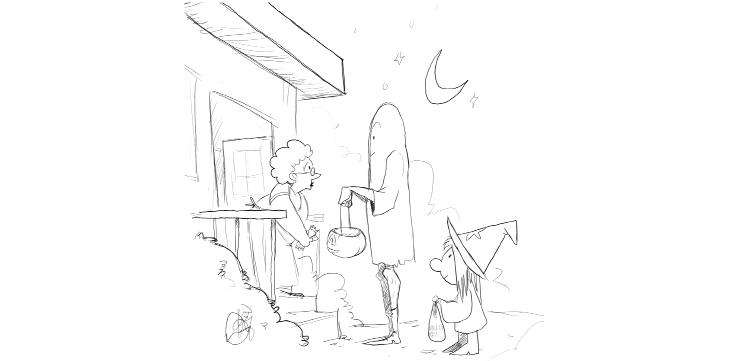Matt Dionne | Editor-in-Chief
Featured Image: How old is too old to trick-or-treat? | Rowan Campbell
If you were to ask a group of children what their favourite holiday is, Halloween would invariably make it near the top of the list—who doesn’t love to dress up and collect free candy?
Toddlers typically sport costumes picked out by their parents—often depicting a joke the child is too young to understand—while school-age children often wear costumes they pick themselves—which is why you’ll often see a flock of Elsas, or several pairs of Jokers and Harley Quinns, and it would come as no surprise if trick-or-treaters encounter countless roaming herds of Pennywises this year.
The best thing about Halloween is that it’s a holiday for both children and adults—children get to dress up as their favourite characters and amass a small fortune of free candy.
Then, once the young ones have all slipped into a sugar coma, the adults get to dress up (or down), drinking until they become zombies.
However, while Halloween provides both young children and adults plenty of fun activities, teens and tweens often become ghosts—too old to trick-or-treat, but too young to go to parties and clubs.
This begs the question: how old is too old when it comes to trick or treating? In some parts of Canada, cities have specific legislation when it comes to Halloween. In Bathurst, New Brunswick, for example, there are by-laws that regulate everything from the age of trick-or-treaters to their costumes, and even the official dates and times when trick-or-treating can occur.
Fortunately, the majority of cities across Canada don’t regulate Halloween so stringently, and it appears Bathurst is an outlier—it’s just begging to be egged with rules like that.
Since the government has yet to weigh in on the subject, we have to turn to the foremost authority on teens’ actions and behaviour—their parents.
A recent poll of parents—most likely those who will be cleaning eggs and toilet paper off their houses on November 1—indicated that only one per cent of voters felt children should stop trick-or-treating at age 11; two per cent felt children should hang up their buckets and pillow cases by age 10; eight per cent felt ages 12, 15, and 16 were all too old for trick-or-treating; nine per cent felt 14 was the last year kids should be trick-or-treating; 11 per cent felt that 17 should be the cut-off, and 43 per cent of voters believe children should never stop trick-or-treating.
So it seems that many parents are in favour of kids trick-or-treating—and it makes sense.
Last year, a Facebook post by Exploretalent.com urged people to welcome teens at their doors with candy, rather than rebuking them.
“If a teenager comes to your door, please give them candy. I would much rather my child be trick-or-treating, at 14 instead of drinking at a party with a bunch of half-naked girls in degrading costumes.”
Many parents agreed with this sentiment, including parenting expert Alyson Schafer, who said: “Adolescence is a time when our kids have one foot in childhood and the other in adulthood. They pine for the sentimentality of childhood with its fun traditions and magical worlds of fairies, Santa Claus, and yes, even Halloween wonders.”
Shafer’s only stipulation was that teens who decide to go trick-or-treating should at least don a costume—which to me, seems fair. If you’re going to ask for free candy, you should at least make some sort of effort.
I may not be a parent, as far as I know, but I agree with Shafer in that teens should be free to enjoy their youth for as long as they like. I don’t think there is any harm in dressing up and participating in some harmless, wholesome fun on a holiday, one which can often devolve into drunken debauchery (continue reading to see where I endorse drunken debauchery!).
So this year, if you find a teenager at your door holding out a bucket filled with candy, don’t chastise them for being “too old” to trick-or-treat—give them some candy, compliment their costume, and consider the pressures society often puts on teens and tweens, pushing them to grow up before they’re ready.


